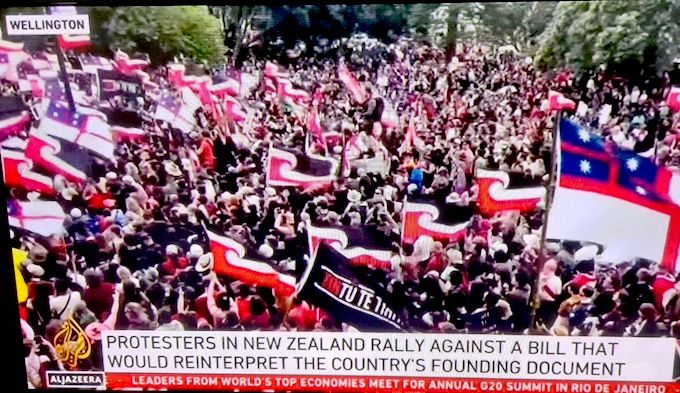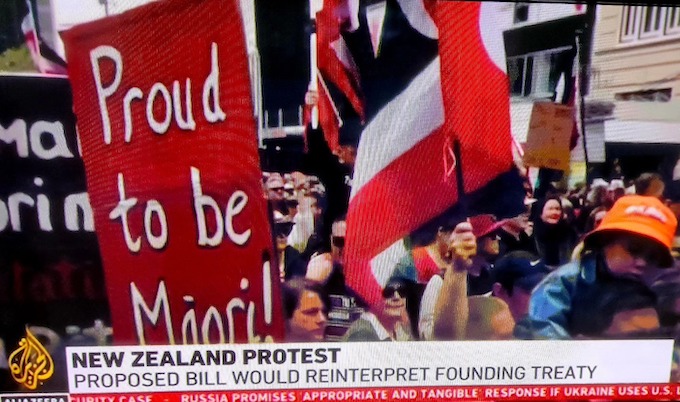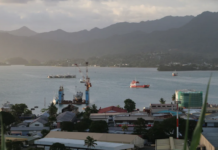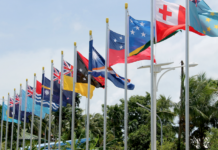
COMMENTARY: By Gavin Ellis
“Flashpoint” in a foreign news story usually brings to mind the Middle East or the border between North and South Korea. It is not a term usually associated with New Zealand but last week it was there in headline type.
News outlets around the world carried reports of the Hīkoi and protests against Act’s Treaty Principles Bill, with the overwhelming majority characterising the events as a serious deterioration in this country’s race relations.
The Associated Press report carried the headline “New Zealand’s founding treaty is at a flashpoint: Why are thousands protesting for Māori rights?”. That headline was replicated by press and broadcasting outlets across America, by Yahoo, by MSN, by X, by Voice of America, and by news organisations in Asia and Europe.
- READ MORE: Protest photographer John Miller records Hīkoi mō te Tiriti with his historic lens
- Other Hīkoi reports
Reuters’ story on the hikoi carried the headline: “Tens of thousands rally at New Zealand parliament against bill to alter indigenous rights”. That report also went around the world.
So, too, did the BBC, which reaches 300 million households worldwide: “Thousands flock to NZ capital in huge Māori protest”.
The Daily Mail’s website is given to headlines as long as one of Tolstoy’s novels and told the story in large type: “Tens of thousands of Māori protesters march in one of New Zealand’s biggest ever demonstrations over proposed bill that will strip them of ‘special rights’”. The Economist put it more succinctly: “Racial tensions boil over in New Zealand”.
In the majority of cases, the story itself made clear the Bill would not proceed into law but how many will recall more than the headline?
An even bleaker view
Readers of The New York Times were given an even bleaker view of this country by their Seoul-based reporter Yan Zhuang. He characterised New Zealand as a country that “veers sharply right”, electing a government that has undone the “compassionate, progressive politics” of Jacinda Ardern, who had been “a global symbol of anti-Trump liberalism”.
Critiquing the current government, The Times story stated: “In a country that has been celebrated for elevating the status of Māori, its indigenous people, it has challenged their rights and prominence of their culture and language in public life, driving a wedge into New Zealand society and setting off waves of protests.”
Christopher Luxon may have judged “limited” support for David Seymour’s highly divisive proposed legislation as a worthwhile price to pay for the numbers to give him a grip on power. For his part, Seymour may have seen the Bill as a way to play to his supporters and hopefully add to their number.
Did either man, however, consider the effect that one of the most cynical political ploys of recent times — giving oxygen to a proposal that has not a hope in hell of passing into law — would have on this country’s international reputation?
Last week’s international coverage did not do the damage. Those outlets were simply reporting what they observed happening here. If some of the language — “flashpoint” and “boiling over” — look emotive, how else should 42,000 people converging on the seat of government be interpreted?
The damage was done by the architect of the Bill and by the Prime Minister giving him far more freedom than he or his proposal deserve.
Nor will the reputational damage melt away, dispersing in as orderly manner like the superbly organised Hīkoi did last Tuesday. It will endure even beyond the six months pointlessly given to select committee hearings on the Bill.

Alerted to the story
International media have been alerted to the story and they will continue to follow it. Many have staff correspondents and stringers in this country or across the Tasman who will be closely monitoring events.
Australia’s ABC last week signalled ongoing protest and its story on the Treaty Principles Bill would have left Australians bewildered that a bill “with no path forward” could be allowed to cause so much discord.
“The Treaty Principles Bill may be doomed,” said the ABC’s Emily Clark, “but the path forward for race relations in New Zealand is now much less clear.”
So, too, is New Zealand’s international reputation as a country where the rights of its tangata whenua were indelibly recognised by those that followed them. Even though imperfectly applied, the relationship is far more constructive than that which many colonised countries have with their indigenous peoples.
We are held by many to be an example to others and that is part of the reason New Zealand has a position in the world that is out of proportion to its size and location.
Damage to that standing is a very high price to pay for giving a minor party a strong voice . . . one that will be heard a very long way away.
Gavin Ellis holds a PhD in political studies. He is a media consultant and researcher. A former editor-in-chief of the New Zealand Herald, he has a background in journalism and communications – covering both editorial and management roles – that spans more than half a century. Dr Ellis publishes Knightly Views where this commentary was first published.











































